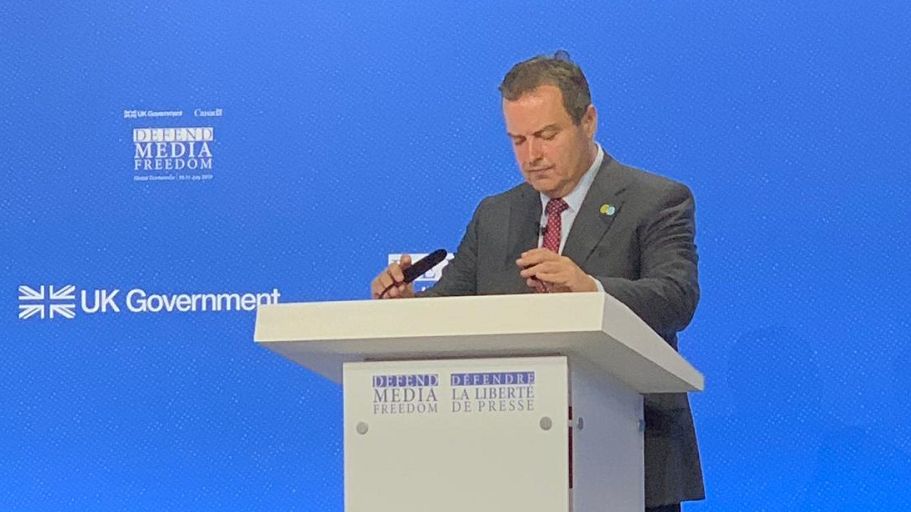



| Thursday, 11 July 2019. | |
| Minister Dacic at the Global Conference on Media Freedom in London | |
| + larger fontnormal font- Smaller font | |||
 The statement by First Deputy Prime Minister and Minister of Foreign Affairs of the Republic of Serbia, Ivica Dacic: The statement by First Deputy Prime Minister and Minister of Foreign Affairs of the Republic of Serbia, Ivica Dacic:
"Excellencies, Ladies and gentlemen, Distinguished colleagues, I am glad to be able to attend this important gathering on behalf of the Republic of Serbia. Allow me, first of all, to thank the Secretary of State for Foreign and Commonwealth Affairs, Mr Jeremy Hunt and Minister of Foreign Affairs of Canada Chrystia Freeland whose valuable initiative brought together here many key actors committed to strengthening media freedom and protecting journalists and media professionals.
\ We take very seriously the question of safety of journalists and impunity for criminal acts committed against them. Therefore, in line with international regulations and in cooperation with international organizations we have been constantly engaged in promoting system-related responses to threats faced by journalists as they do their work. The relevance of this topic to us can be seen from the fact that when Serbia held the OSCE Chairmanship-in-Office in 2015, in my capacity as Chairperson-in-Office, I had the honour to open the OSCE Conference on Protection of Safety and Integrity of Journalists precisely in my capital, Belgrade. Recognizing the importance of this issue, we decided then that this topic should be the first on the agenda of the Chairmanship-in-Office conferences. Allow me, therefore, to take this opportunity to welcome the establishment of the High Level Panel of Legal Experts on Media Freedom as well as the announced establishment of task forces composed of representatives of international organizations and experts. Experience-sharing on challenges faced by our states in connection with these issues including best practices that yielded successful results is surely one of the best ways to join forces to ensure a safe working environment for journalists and consequently conditions more favourable to the development of our democratic societies. This is exactly the experience we have gained from the aforementioned conference. I would like to share with you another experience we deem invaluable. Six years ago, in cooperation with journalists, my Government set up a Commission for investigating the killings of journalists since in some cases these investigations lasted for more than ten years. The Commission was no doubt successful as can be seen from a recent court decision in the first instance, when in cooperation with the competent authorities and with express political will of the Government, it managed to bring to justice a man who murdered one of their colleagues. Impunity is an aspect which requires a lot of hard work because this is how we send a message that crime does not pay off. Killing of journalists, in addition to causing a personal tragedy, is an attack on the very foundations of our societies. Last year, the Government extended the Commission's mandate to include the cases of journalists who were killed or who went missing during the conflicts in the former Yugoslavia. Unfortunately, in terms of journalists killed in conflicts, Serbia holds an unfortunate record – for the first time in history, a media outlet was identified as a legitimate military target and 16 people working in our public broadcasting service were killed in the bombing of Radio Television of Serbia. I take this opportunity to invite you to join forces in action to prevent such occurrences in the future and try to make sure that no media organization is ever proclaimed a legitimate military target. Even though information is a powerful tool, universal code of conduct obliges us to confront information by other information or by opposite arguments rather than by bombs. Due to the power of information, we are increasingly dealing with disinformation. This is not a novelty but new media and dissemination options make disinformation readily available, thus posing a greater threat than ever before. This is actually an emerging challenge and our citizens need to be prepared for it. The way to do this, for example, would be to build a future society whose citizens will be better equipped to navigate a vast sea of information by teaching our children to recognize the voices of truth and true values in a cacophony offered to them. In addition to ensuring a legally regulated media landscape, educating and training citizens to make the best use of information available to them is surely a task of any responsible state. Seeking to keep in step with the times, the Government of the Republic of Serbia is developing media literacy programs and Belgrade will host a major international conference in cooperation with UNESCO in September this year. Dear colleagues, I thank you for your attention and wish all of us a successful work!" |